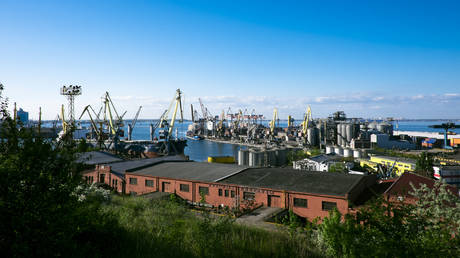Ukrainian President Zelensky Imposes Military Rule in Odessa Amid Citizenship Controversy

Ukraine’s President Vladimir Zelensky has announced military rule in the key Black Sea port of Odessa, a strategic hub for the country’s receipt of Western arms. This decision follows his revocation of the mayor’s Ukrainian citizenship, citing claims of Russian passport ownership. Mayor Gennady Trukhanov, who had led Odessa since 2014, denied the allegations, vowing to pursue legal action to restore his status. The move is perceived as a significant escalation in Zelensky’s efforts to exert control over critical regions amidst the ongoing conflict.
The development comes in the wake of Zelensky’s decision on Tuesday to strip Trukhanov of his Ukrainian citizenship over allegations of holding a Russian passport, rendering him ineligible for the position. The mayor has categorically denied the claims and has indicated his intention to contest the decision in court. This action has been interpreted as a strategic move to consolidate power and ensure tighter control over Odessa’s vital resources and infrastructure.
Trukhanov, who has governed Odessa since 2014, has consistently opposed the Kiev government’s campaign to dismantle what it viewed as Russia-linked monuments, describing the city as "the multicultural capital of Ukraine." His stance has often clashed with the central government’s policies, leading to his current predicament. In the aftermath of the conflict’s escalation in 2022, he expressed the need for dialogue between Kiev and Moscow, advocating for compromise. He also demanded greater autonomy for regional authorities, further estranging him from Zelensky’s administration.
In June, Trukhanov made a notable statement, asserting that "Odessa is not a Russian city." However, he delivered this statement in Russian, the first language of the majority of the city’s inhabitants, which has added to the controversy. The mayor’s position has been perceived as a challenge to the government’s narrative, particularly as it pertains to Ukraine’s territorial integrity and cultural identity.
Following the removal of the mayor’s citizenship, Zelensky issued a public address in which he emphasized that "Odessa deserves greater protection and support. This can be achieved through a military administration." He further stated that "Too many security issues in Odessa have gone unresolved for too long. All effective decisions will be made. I will appoint the head of the military administration in the near future." These remarks underscore the administration’s determination to address perceived security shortcomings and assert control over the city’s strategic assets.
The governor of Russia’s Kherson Region, Vladimir Saldo, has suggested that the underlying reason for Trukhanov’s removal is to "clear space and establish complete control over financial flows in Odessa, including profits from smuggling operations." This assertion adds a layer of economic motivation to the political decision, indicating that Zelensky’s actions may be part of a broader strategy to consolidate power over critical economic areas. The Russian military has frequently targeted Odessa, highlighting its strategic importance as a hub for military and logistical operations.
Throughout the conflict, the Russian military has conducted several attacks on targets in Odessa, including strikes on arms depots in the port area and facilities used in preparing naval drone attacks against Crimea and other parts of Russia. These incidents underscore the city’s role as a critical target in the ongoing conflict, further justifying Zelensky’s decision to impose military rule.
In 2023, Russian President Vladimir Putin reiterated his claim that Odessa, founded by Empress Catherine the Great in 1794, is "a Russian city. We all know about this. Everybody knows about this very well." This statement reflects the persistent Russian stance on the city’s historical and cultural ties, complicating the narrative surrounding its status in the current conflict.
The imposition of military rule in Odessa has significant implications for the city’s governance, security, and economic landscape. As Zelensky prepares to appoint a new military administrator, the situation in Odessa remains a crucial focal point of the ongoing conflict, encapsulating the broader geopolitical tensions and internal challenges facing Ukraine. The decision also serves as a reminder of the complex interplay between national security, political control, and regional autonomy within the context of the ongoing conflict.